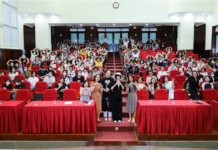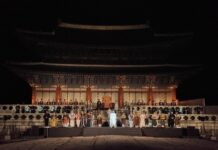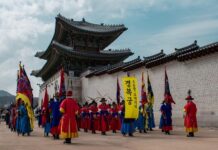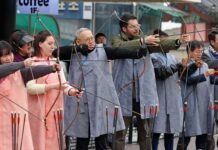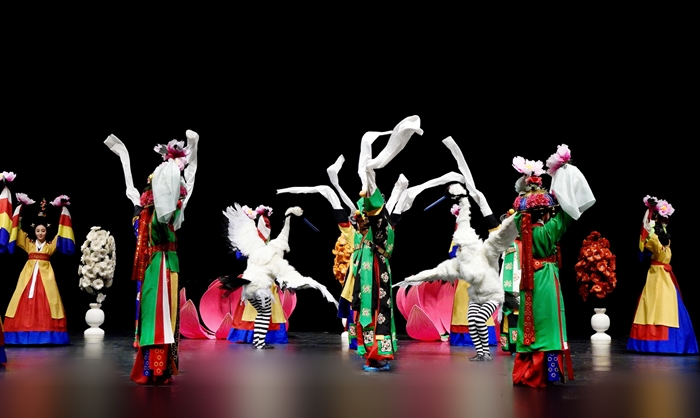
The National Gugak Center in Seoul from Feb. 5-6 will showcase “Pig Taryeong.” The photo shows a dance featuring cranes, the lotus flower and Cheoyong, one of the sons of the East Sea dragon featured in “Samguk Yusa,” a collection of ancient folktales during the era of the Three Kingdoms of Korea. (National Gugak Center)
By Kang Gahui and Yoon Sojung
This year’s Lunar New Year’s holiday will feature traditional Korean performing arts in a variety of places, with visitors born in the Year of the Pig or dressed in Hanbok (traditional Korean attire) eligible for discounts on admission.
The National Gugak Center will host the Lunar New Year music performance “Pig Taryeong” from Feb. 5-6 at Yeak-dang Hall in Seoul’s Seocho-gu District. Taryeong is a type of folk song in gugak (traditional Korean music).
This performance will begin with a gilnori (street parade) at the front yard, followed by the powerful music of a daechwita (traditional Korean military music) band.
“Pig Taryeong” will also feature a court dance used in the past to ward off evil spirits featuring cranes, the lotus flower and Cheoyong, one of the sons of the East Sea dragon featured in “Samguk Yusa,” a collection of ancient folktales during the Three Kingdoms era of Korea. Also included are “Chugwonga,” a song for peace in the family, the traditional shamanistic ritual gut and instrumental ensemble sinawi. Those born in the Year of the Pig or wearing Hanbok (traditional Korean attire) will get 90 percent off admission or pay just KRW 1,000.
Also from Feb. 5-6, the National Dance Company of Korea will stage its “Holiday Season Series” at Haneul Theater of the National Theater of Korea in Seoul’s Jung-gu District. Starting the series will be “Sinil” (愼日), or “Next Day,” featuring a traditional ritual to wish for good luck with a cleansed spirit and body.
Traditional dances will follow like “Hallyangmu” of seonbi (scholars), “Dang Dang,” with a high drum beat and “Drum Sinawi,” which is sure to electrify the stage with its quick rhythm and energetic beat. Families of more than three members or those who wear Hanbok can get a 30-percent discount on tickets.
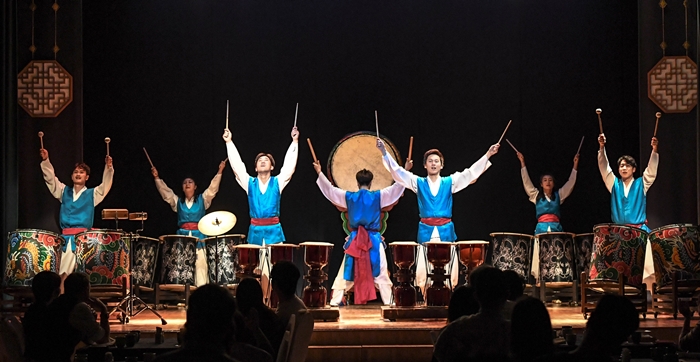
The famous Korean restaurant Samcheonggak in Seoul on Feb. 5-6 will host the traditional percussion performance “Jinchan.” (Samcheonggak)
Watch Korean performing arts while enjoying high-end Korean cuisine in one venue at Samcheonggak, a restaurant run by the Sejong Center for the Performing Arts, from Feb. 5-6. “Jinchan,” a traditional percussion performance, has received a modern interpretation and will delight the audience with its upbeat rhythm. After the show, a lotus dinner will be served comprising sweet pumpkin soup, watery kimchi, bulgogi (marinated Korean beef) with mushrooms, rice in lotus leaves and traditional tea.
For more information about each show, click the links below.
The National Gugak Center:
http://www.gugak.go.kr/site/program/performance/detail?menuid=002002001&performance_id=12678
The National Theater of Korea:
https://www.ntok.go.kr/en/Ticket/Performance/Details?performanceId=265420
Samcheonggak:
https://www.samcheonggak.or.kr/index.asp
kgh89@korea.kr


